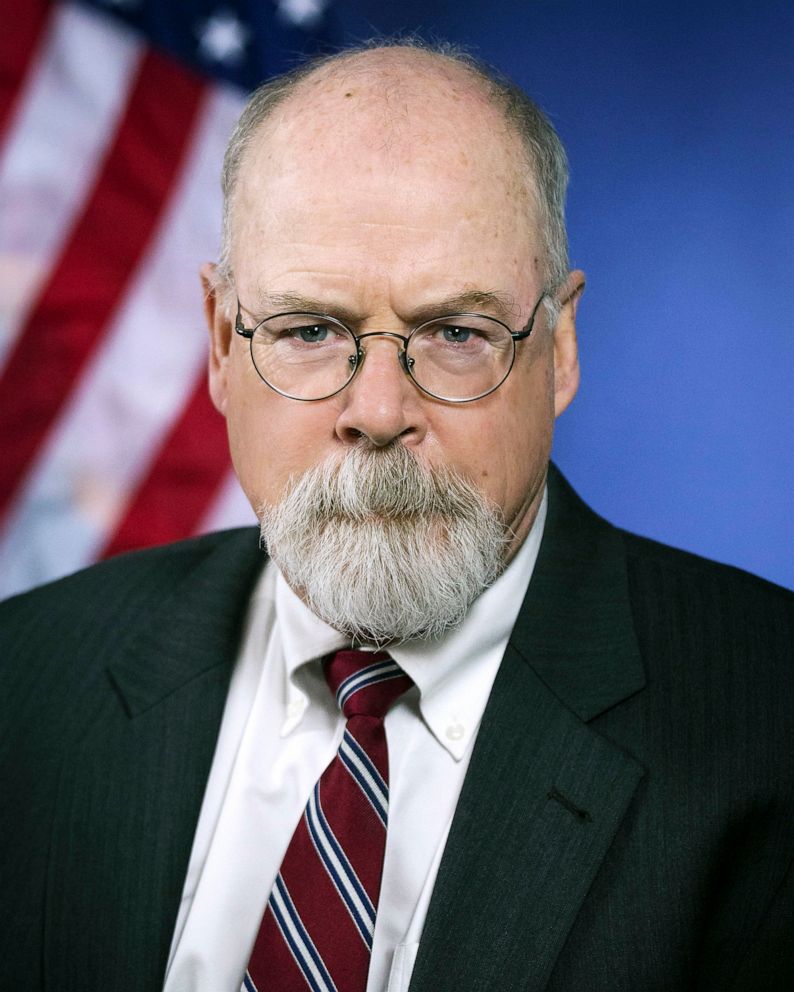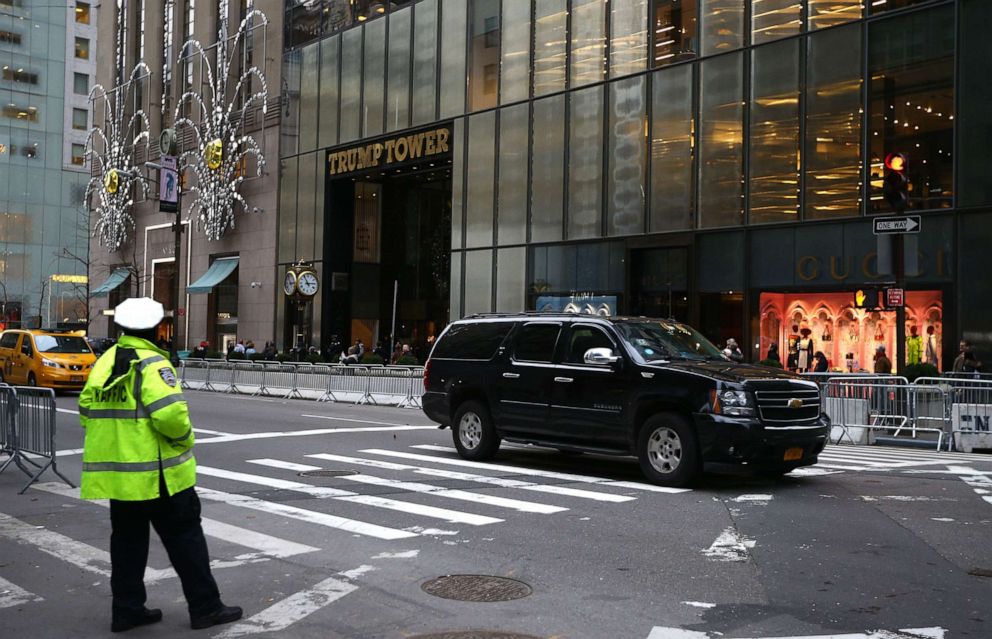Special counsel, Democratic lawyer clash over new allegations regarding data purported to tie Trump to Russia
Cybersecurity lawyer Michael Sussmann was charged in 2021 with lying to the FBI.
A former lawyer for the Democratic Party indicted by special counsel John Durham for allegedly lying to the FBI has accused Durham's office of leveling false allegations that he claims are intended to politicize his case.
Michael Sussmann, a cybersecurity lawyer who previously worked for Hillary Clinton's 2016 presidential campaign, was charged last year by Durham for allegedly lying to the then-FBI general counsel James Baker in a July 2016 meeting where Sussmann provided information about data that he said showed a strange link between the Trump Organization and Russia's Alfa Bank -- an allegation later investigated by the FBI but determined not to be nefarious.
Sussmann, who has pleaded not guilty, is alleged to have lied to Baker by saying he was not passing along the information on behalf of any specific client, while Durham says Sussmann was in fact working on behalf of Hillary Clinton's presidential campaign and a tech executive named Rodney Joffe. Sussmann, however, denies that he ever told Baker he was not representing the interests of any client and, additionally, says he was not acting on behalf of the Clinton campaign in passing along the allegations to Baker.
This past weekend, Durham put forward new allegations in a seemingly unrelated filing where he sought to raise potential conflict concerns over the attorneys currently representing Sussmann.
Specifically, Durham claimed his office has evidence that Joffe worked with a group of cybersecurity researchers to collect internet data about the Trump Organization, and in doing so accessed so-called 'DNS traffic data' -- records showing back-and-forth communications that computers or cellphones have with internet servers -- from entities including Trump Tower, Donald Trump's Central Park West apartment building, and the Executive Office of the President of the United States.
Durham alleges that Joffe's company had a contract with Executive Office of the President to provide DNS-related services, but that he "exploited this arrangement ... for the purpose of gathering derogatory information about Donald Trump."
According to the Durham filing, in a meeting with the CIA in February of 2017, Sussmann allegedly passed along information and data from Joffe and others that Sussmann said appeared suspicious and showed that "Trump and/or his associates" may have been "using supposedly rare, Russian-made wireless phones in the vicinity of the White House and other locations."
Trump and numerous other Republicans went on to cite Durham's filing as proof that Hillary Clinton's campaign directed an illegal conspiracy to spy on Trump both during and possibly after his 2016 election victory, though nowhere in Durham's filing did prosecutors say that the effort was directed by or involved the Clinton campaign, that any of the alleged gathering of data took place after Trump had taken office, or that any of the alleged conduct -- even if it took place -- was illegal.

Durham raised the new set of allegations as part of a filing regarding concerns over whether Sussmann's defense attorneys have a conflict of interest in representing him. No additional criminal charges have been brought against Sussmann or others related to the new allegations.
Contrary to reports, nowhere in Durham's filing does he state that lawyers for the Clinton campaign paid a tech company to "infiltrate" servers belonging to Trump Tower and later the White House.
Joffe did not respond to a request for comment from ABC News.
In a statement provided to ABC News, a spokesperson for Joffe disputed Durham's allegations, calling Joffe an "apolitical Internet security expert with decades of service to the U.S. Government who has never worked for a political party, and who legally provided access to DNS data obtained from a private client that separately was providing DNS services to the Executive Office of the President (EOP)."
"Under the terms of the contract, the data could be accessed to identify and analyze any security breaches or threats," Joffe's spokesperson said. "As a result of the hacks of EOP and DNC [Democratic National Committee] servers in 2015 and 2016, respectively, there were serious and legitimate national security concerns about Russian attempts to infiltrate the 2016 election. Upon identifying DNS queries from Russian-made Yota phones in proximity to the Trump campaign and the EOP, respected cybersecurity researchers were deeply concerned about the anomalies they found in the data and prepared a report of their findings, which was subsequently shared with the CIA."
Jody Westby and Mark Rasch, attorneys for David Dagon, a Georgia Institute of Technology analyst who was part of the research team referenced in Durham's filing, told ABC News that the team only provided data that was legally obtained during the Obama administration. Westby and Rasch said researchers were looking at attempted malware attacks that were believed to be targeting the White House, and that contrary to Durham's allegations, Joffe was never "tasking" the researchers in their work.
"He was simply providing data. He may have commented on it, but he did not task the researchers in what they were doing," Westby and Rasch said. "They were in no way ever working for Rodney Joffe."
Both lawyers maintain that the effort to bring this information to the attention of the FBI and CIA was appropriate, and say they're concerned that Durham's actions could have a chilling effect on researchers bringing cybersecurity information to the attention of law enforcement and intelligence agencies in the future.

"What you don't want to have happen, which we already see happening, is for researchers to be chilled in bringing concerns about cybersecurity threats to appropriate government agencies," they said. "And right now, the cybersecurity community is largely afraid to talk to law enforcement because of what has happened and how this case has been handled."
Late Monday, Sussmann's attorneys responded to Durham's new filing, accusing him of making "false" allegations that "are plainly intended to politicize this case, inflame media coverage, and taint the jury pool."
Sussmann's attorneys also dispute what they say appears to be Durham's leading theory, that Sussmann was acting in concert with the Clinton campaign when he took the DNS data to the CIA in February of 2017.
"...the Motion conveniently overlooks the fact that Mr. Sussmann's meeting with Agency-2 happened well after the 2016 presidential election, at a time when the Clinton Campaign had effectively ceased to exist," Sussmann's attorneys say in their filing. "Unsurprisingly, the Motion also omits any mention of the fact that Mr. Sussmann never billed the Clinton Campaign for the work associated with the February 9, 2017 meeting, nor could he have (because there was no Clinton Campaign)."
The filing directly cites former President Trump's numerous statements released since Durham's filing, including where he suggested the alleged conduct "would have been punishable by death" in a "stronger period of time."
Sussmann's attorneys accuse Durham of purposefully ginning up the new wave of furor, noting that the new allegations were included in a completely unrelated filing regarding potential conflicts of interest among Sussmann's legal team.
"This is not the first time in this case that the Special Counsel has sought to include allegations about uncharged conduct in public filings and done so using inflammatory and prejudicial rhetoric," the filing says. "The Indictment is 27 pages long and reads as though there was a vast conspiracy, involving the Clinton Campaign and Mr. Sussmann, to defraud the FBI into investigating Donald Trump as part of an 'October surprise.' But the Indictment does not charge anyone other than Mr. Sussmann; the Indictment does not charge a conspiracy; and the Indictment does not even charge a fraud."
Sussmann's attorneys have asked the judge in the case to strike from the record Durham's latest series of allegations.
A spokesperson for Durham declined to comment to ABC News when asked about the accusation put forward by Sussmann.




